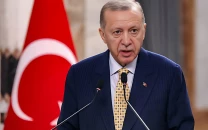In a first, Israel's Arabs could lead parliamentary opposition
No party drawn from the 21 per cent Arab minority has ever been part of an Israeli government

Joint List candidates celebrate before supporters at the alliance's campaign headquarters in the northern Israeli city of Nazareth on September 17, 2019, as the first exit polls are announced on television. PHOTO: AFP
A surge in turnout gave the Arab-dominated Joint List 13 of the Knesset’s 120 seats, making it the third-largest grouping behind Prime Minister Benjamin Netanyahu’s right-wing Likud Party, with 31 seats, and Benny Gantz’s centrist Blue and White, with 33.
That would make the Joint List the largest opposition grouping in parliament if a unity government takes shape, a realistic possibility even though Gantz rebuffed Netanyahu’s initial invitation.
No party drawn from the 21 per cent Arab minority has ever been part of an Israeli government. But if Joint List head Ayman Odeh, 44, becomes opposition leader, he would receive monthly briefings from the Mossad intelligence agency and meet visiting heads of state.
This would provide a platform to voice Arab complaints of discrimination against them and give a bigger platform to Arab parties that differ with parties drawn from the country’s Jewish majority.
“It is an interesting position, never before held by someone from the Arab population. It has a lot of influence,” Odeh told reporters outside his home in Haifa, a mixed Arab and Jewish city in northern Israel.
But although the Joint List will be the single biggest group, other opposition parties combined would have enough seats to block his appointment through an absolute majority vote, analysts said.




1725099588-0/BeFunky-(41)1725099588-0-208x130.webp)














COMMENTS
Comments are moderated and generally will be posted if they are on-topic and not abusive.
For more information, please see our Comments FAQ